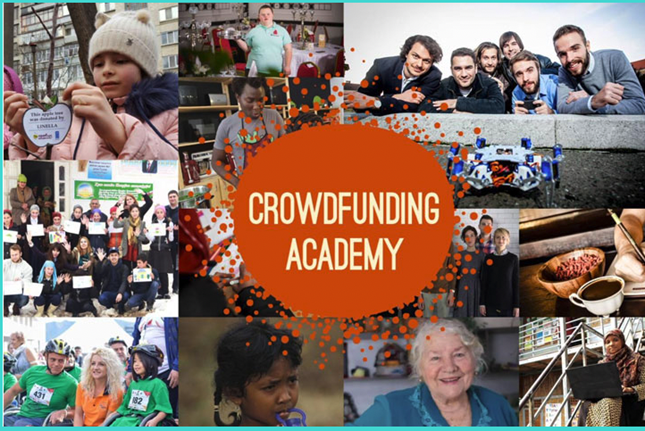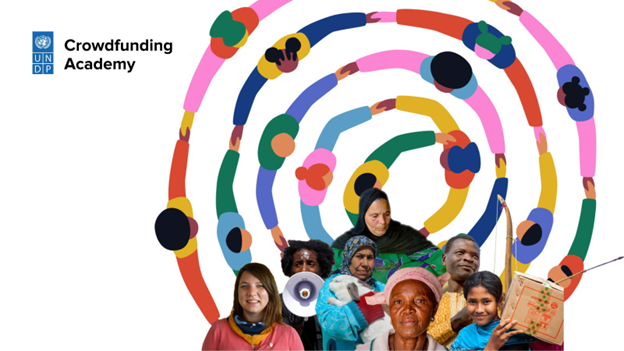 UNDP Crowdfunding Academy
Building resilient communities through crowdfunding: a joint initiative customized to raise funds for a wide variety of projects
UNDP Crowdfunding Academy
Building resilient communities through crowdfunding: a joint initiative customized to raise funds for a wide variety of projects

Challenges
Despite over US$1 trillion of public and private investment in the SDGs, the widening poverty and inequality worldwide requires a bold increase in development financing. The gap for financing SDGs has increased from US$2.5 trillion to US$4.2 trillion since 2020 due to emergency spending on COVID-19 in developing countries. Shifting donor priorities, lack of capacity, legal barriers, conflicts, or major economic hardships and challenges have impacted financial resilience and access to financial opportunities, particularly in the post COVID-19 situation.
Innovative and alternative financing mechanisms, such as crowdfunding, can address the investment gap that is required to achieve the SDGs.
Towards a Solution
The UNDP Crowdfunding Academy (CFA) is a programme, a platform and a community that provides visibility, funding and supports capacity-building and knowledge-sharing among countries. It is an intensive eight-week online course, whose main goal is to promote crowdfunding as an alternative and an innovative finance mechanism among UNDP Country Offices, governments, civil society organizations (CSOs) and other partners to bridge the SDG financing gap. The academy targets all 17 SDGs by working with the participants on a range of campaign topics – from girls’ education and ocean protection to alleviating poverty and access to clean water.
The first Crowdfunding Academy (CFA) was launched in Istanbul in 2015 by the UNDP Alternative Finance Lab (AltFinLab) at the UNDP Istanbul Regional Hub (IRH) and UNDP BERA Innovative Digital Partnerships Team, and since then has been replicated in and by countries from the Global South, like Bangladesh, Cabo Verde, Costa Rica, Ecuador, Fiji, Indonesia, Kazakhstan, Lebanon, Morocco, Panama, the Philippines, Somalia, the State of Palestine, Thailand, Tunis, Uruguay and Uzbekistan, with new academies and campaigns coming to India, Sri Lanka, and all IsDB Members States (57 countries). So far 30 CFAs have been conducted.
The CFA is also a platform that enables countries to directly collaborate and exchange expertise, and implement top-down and bottom-up strategies for establishing crowdfunding ecosystems in their countries.
The online programme is hosted on two knowledge-sharing platforms – Sparkblue (UNDP) and Kaya (as part of the NGO Empowerment Programme portal at the Humanitarian Leadership Academy) – which makes it easy to replicate and adapt around the world thereby ensuring its sustainability.
Among UNDP's responsibilities are implementation and scaling up of the Crowdfunding Academies, creating crowdfunding ecosystems in countries, expanding local, national and global crowdfunding communities, conducting peer-to-peer learning workshops and codifying emerging best practices.
In partnership with the Islamic Development Bank, UNDP set up an IsDB - ISFD NGO Empowerment Program for Poverty Reduction Program (Tadamon), which involves government and local partners undertaking either replication (knowledge-sharing) or implementation (capacity-building and campaign development) of academies in the entire 57 member countries of IsDB. For example, crowdfunding NGO from Lebanon that went through the CFA training programme is now under implementation at the academy in Tunis. So far 6 Crowdfunding Academies have been fully completed, 120 CSOs trained and more than 40 CSOs have launched their campaigns.
For the recovery of the Punta del Diablo Public Park supported by UNDP Uruguay, an area affected by fires in 2021, Plantatón Uruguay successfully raised funds that allowed 1,111 native trees to be planted and cared for. This was inspired by other campaigns led by Uzbekistan to restore life to the Aral Sea and Costa Rica’s Huella de Futuro campaign, which planted 200,000 trees in the North Zone.
As part of UNDP CFA community of practice from Thailand to Ecuador and the Philippines to Costa Rica crowdfunding campaigns were launched aimed at making a real difference both for nature and for livelihoods and in ensuring a crisis response.
To date over 200 teams have been supported or participated in the course and launched over 100 campaigns. Overall, due to crowdfunding efforts, UNDP, CSOs and other partners mobilized about US$8 million through crowdfunding campaigns to address national level challenges for successful implementation of the SDGs.
The academy has been replicated and currently has several pillars. The objective is to:
- Support CSOs as part of Tadamon or the NGO Empowerment Programme which targets 57 OIC member States (six editions, with approximately 150 teams).
- Support social impact Innovators, as part of BOOST, a social impact acceleration programme in Europe and Central Asia (2 editions, with 18 teams).
Contact Information
Countries involved
Supported by
Implementing Entities
Project Status
Project Period
URL of the practice
Primary SDG
Primary SDG Targets
Similar Solutions
| NAME OF SOLUTION | Countries | SDG | Project Status | |
|---|---|---|---|---|
100% Online Electronic Apostille and Legalization Sharing Colombia’s effective e-government system with other countries in the region |
Albania, Bangladesh, Barbados, Bosnia and Herzegovina, Burkina Faso, Cabo Verde, China, Colombia, Costa Rica, Croatia, Djibouti, Ecuador, Egypt, Fiji, India, Indonesia, Iraq, Jordan, Kazakhstan, Kosovo, Kyrgyzstan, Lebanon, Libya, Madagascar, Maldives, Mexico, Montenegro, Morocco, Niger, North Macedonia, Pakistan, Panama, Philippines, Republic of Moldova, Senegal, Serbia, Somalia, Sri Lanka, State of Palestine, Tajikistan, Thailand, Tunisia, Türkiye, Uruguay, Uzbekistan, Yemen | 16 - Peace and Justice Strong Institutions | Completed | View Details |
360-Degree Awareness Tool to Fight COVID-19 Raising awareness and ensuring public wellbeing through a one-stop platform for fighting COVID-19 in Bangladesh |
Albania, Bangladesh, Barbados, Bosnia and Herzegovina, Burkina Faso, Cabo Verde, China, Colombia, Costa Rica, Croatia, Djibouti, Ecuador, Egypt, Fiji, India, Indonesia, Iraq, Jordan, Kazakhstan, Kosovo, Kyrgyzstan, Lebanon, Libya, Madagascar, Maldives, Mexico, Montenegro, Morocco, Niger, North Macedonia, Pakistan, Panama, Philippines, Republic of Moldova, Senegal, Serbia, Somalia, Sri Lanka, State of Palestine, Tajikistan, Thailand, Tunisia, Türkiye, Uruguay, Uzbekistan, Yemen | 16 - Peace and Justice Strong Institutions | Ongoing | View Details |
A Billion Brains: Smarter Children, Healthier Economies High Level Meeting on South-South Cooperation for Child Rights |
Albania, Bangladesh, Barbados, Bosnia and Herzegovina, Burkina Faso, Cabo Verde, China, Colombia, Costa Rica, Croatia, Djibouti, Ecuador, Egypt, Fiji, India, Indonesia, Iraq, Jordan, Kazakhstan, Kosovo, Kyrgyzstan, Lebanon, Libya, Madagascar, Maldives, Mexico, Montenegro, Morocco, Niger, North Macedonia, Pakistan, Panama, Philippines, Republic of Moldova, Senegal, Serbia, Somalia, Sri Lanka, State of Palestine, Tajikistan, Thailand, Tunisia, Türkiye, Uruguay, Uzbekistan, Yemen | 17 - Partnerships for the Goals | Completed | View Details |
A-Card Initiative |
Albania, Bangladesh, Barbados, Bosnia and Herzegovina, Burkina Faso, Cabo Verde, China, Colombia, Costa Rica, Croatia, Djibouti, Ecuador, Egypt, Fiji, India, Indonesia, Iraq, Jordan, Kazakhstan, Kosovo, Kyrgyzstan, Lebanon, Libya, Madagascar, Maldives, Mexico, Montenegro, Morocco, Niger, North Macedonia, Pakistan, Panama, Philippines, Republic of Moldova, Senegal, Serbia, Somalia, Sri Lanka, State of Palestine, Tajikistan, Thailand, Tunisia, Türkiye, Uruguay, Uzbekistan, Yemen | 10 - Reduced Inequalities | Completed | View Details |
Accelerating Digital Transformation in All Ministries in Bangladesh Promoting the rapid design and implementation of plans to digitize all ministries and subordinate government institutions in Bangladesh |
Albania, Bangladesh, Barbados, Bosnia and Herzegovina, Burkina Faso, Cabo Verde, China, Colombia, Costa Rica, Croatia, Djibouti, Ecuador, Egypt, Fiji, India, Indonesia, Iraq, Jordan, Kazakhstan, Kosovo, Kyrgyzstan, Lebanon, Libya, Madagascar, Maldives, Mexico, Montenegro, Morocco, Niger, North Macedonia, Pakistan, Panama, Philippines, Republic of Moldova, Senegal, Serbia, Somalia, Sri Lanka, State of Palestine, Tajikistan, Thailand, Tunisia, Türkiye, Uruguay, Uzbekistan, Yemen | 10 - Reduced Inequalities | Ongoing | View Details |

